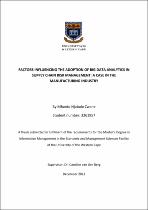| dc.description.abstract | In Africa, supply chain processes are under pressure from political, economic and security risks that disrupt the free flow of goods. In South Africa, the manufacturing industry has high growth potential, however, the industry is bogged by supply chain risks that inhibit the flow of information, raw material or finished goods amongst supply chain partners. Supply Chain Risk Management has emerged as a process by which firms can identify, assess, and mitigate risks within their supply chains, enabling them to reduce uncertainties. Currently, SCRM continues to elude practitioners and scholars due to the shortage of skills, lack of experience, the absence of consensus on what SRCM is, and the lack of data analytics tools and platforms to process Big Data. Supply chain professionals have yet to adopt Big Data Analytics despite benefits such as improved risk evaluation, resilience planning, vulnerability reduction, increased robustness and resilience of the supply chain, and improved profitability and sustainability of the firm. | en_US |

